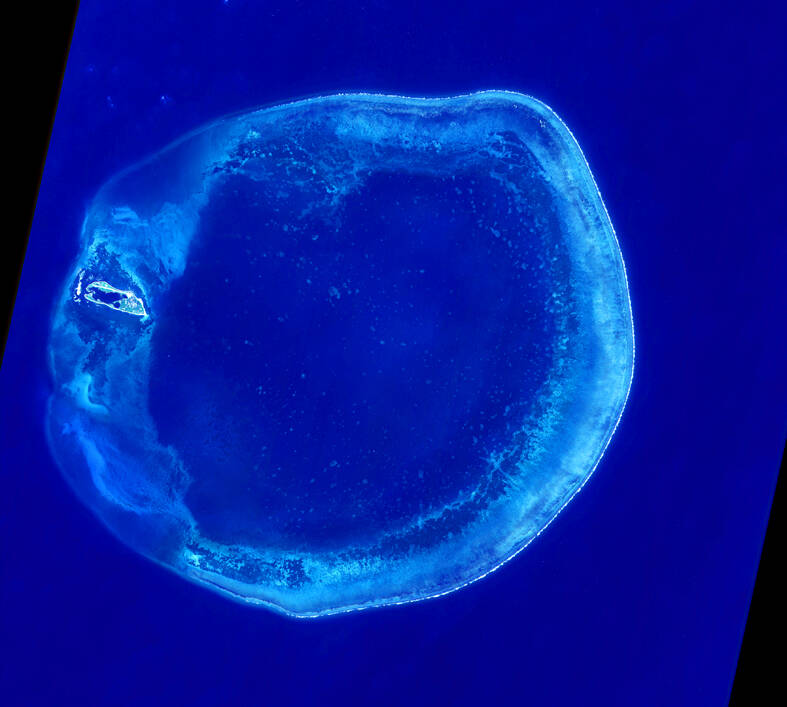The Coast Guard Administration (CGA) has so far this year expelled Chinese fishing vessels 77 times and detained six small boats for illegally entering restricted waters near the Pratas Islands (Dongsha Islands, 東沙群島), the agency said on Sunday.
The statement came a day after Academia Sinica Biodiversity Research Center chief executive officer Jeng Ming-shiou (鄭明修) said that the atoll, which is north of the South China sea and is rich in fishery resources, faces a severe threat from illegal fishing.
The Dongsha Atoll National Park, Taiwan’s first marine national park, prohibits all commercial and private fishing in the area to protect its rich and abundant marine population.

Photo courtesy of Jeng Ming-shiou
Jeng, who has led several diving teams to remove crown-of-thorns starfish that kill coral reefs in the area, said that last year he had seen Chinese fishers illegally enter restricted waters near the atoll and engage in cyanide fishing near coral reefs at night.
Cyanide fishing is the practice of spraying a sodium cyanide solution into an area to catch fish alive.
“These illegal Chinese fishing vessels mostly came from China’s Guangdong Province, and presumably they would ship the poisoned fishes to Guangdong or Hong Kong to sell,” Jeng said.
Cyanide might accumulate in the bodies of people who often consume fish caught with the toxic chemical, increasing their risk for liver disease or cancer, while seawater contaminated by cyanide could cause fish in an area to disappear over a few years, destroying the marine ecosystem, he said.
The CGA has been enforcing the fishing ban in the area, but fishing vessels are difficult to guard against, Jeng said.
Sometimes vessels are escorted by China Coast Guard ships, and some park larger vessels outside the restricted waters and use smaller boats to engage in cyanide fishing, he added.
In March 2016, the CGA stopped the Chinese vessel Ching Ching Fishing 05055 south of the Pratas Islands, finding three green sea turtles, 15,000kg of coral, 400kg of giant clams and six Triton snail (Charonia tritonis) shells, as well as 40kg of toxic chemicals onboard, Jeng and news reports at the time said.
As little human activity occurs in the Pratas Islands, coral cover in nearby waters has been as high as 60 to 80 percent, but the corals are under threat from an outbreak of crown-of-thorns starfish in the past few years, he said.
Triton snails are natural predators of crown-of-thorns starfish, but their population has fallen in part due to fishing, making crown-of-thorns starfish outbreaks more serious, he said.
Illegal fishing is the main cause of environmental damage near Dongsha Atoll, and the China Coast Guard should not be aiding illegal fishing vessels, he said.
The CGA has deployed larger vessels to patrol waters near Dongsha Atoll, and using multipurpose boats of the squad deployed on the island, it is protecting the area and closely monitoring the movements of Chinese vessels, to defend the nation’s sovereignty and ensure the sustainable development of marine resources in the area.

Several Chinese Nationalist Party (KMT) officials including Chairman Eric Chu (朱立倫) are to be summoned for questioning and then transferred to prosecutors for holding an illegal assembly in Taipei last night, the Taipei Police said today. Chu and two others hosted an illegal assembly and are to be requested to explain their actions, the Taipei City Police Department's Zhongzheng (中正) First Precinct said, referring to a protest held after Huang Lu Chin-ju (黃呂錦茹), KMT Taipei's chapter director, and several other KMT staffers were questioned for alleged signature forgery in recall petitions against Democratic Progressive Party (DPP) legislators. Taipei prosecutors had filed

Taiwan would welcome the return of Honduras as a diplomatic ally if its next president decides to make such a move, Minister of Foreign Affairs Lin Chia-lung (林佳龍) said yesterday. “Of course, we would welcome Honduras if they want to restore diplomatic ties with Taiwan after their elections,” Lin said at a meeting of the legislature’s Foreign Affairs and National Defense Committee, when asked to comment on statements made by two of the three Honduran presidential candidates during the presidential campaign in the Central American country. Taiwan is paying close attention to the region as a whole in the wake of a

NEW WORLD: Taiwan is pursuing innovative approaches to international relations through economics, trade and values-based diplomacy, the foreign minister said Taiwan would implement a “three-chain strategy” that promotes democratic values in response to US tariffs, Minister of Foreign Affairs Lin Chia-lung (林佳龍) said. Taiwan would aim to create a “global democratic value chain,” seek to capitalize on its position within the first island chain and promote a “non-red supply chain,” Lin was quoted as saying in the ministry’s written report to the Legislative Yuan submitted ahead of the legislature’s Foreign Affairs and National Defense Committee meeting slated for today. The Ministry would also uphold a spirit of mutual beneficial collaboration, maintaining close communication and consultations with Washington to show that Taiwan-US cooperation

Taiwan and the US have begun trade negotiations over tariffs imposed by US President Donald Trump earlier this month, Minister of Foreign Affairs Lin Chia-lung (林佳龍) said in an interview this morning before reporting to the Legislative Yuan’s Foreign Affairs and National Defense Committee. The Taipei Economic and Cultural Representative Office (TECRO), Taiwan’s de facto embassy in the US, has already established communication channels with the US Department of State and the US Trade Representative (USTR), and is engaging in intensive consultations, he said. Points of negotiation include tariffs, non-tariff trade barriers and issues related to investment, procurement and export controls, he